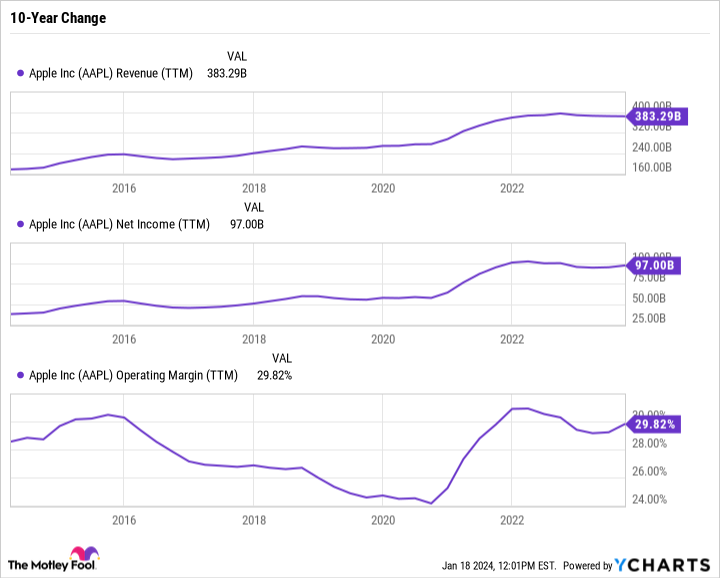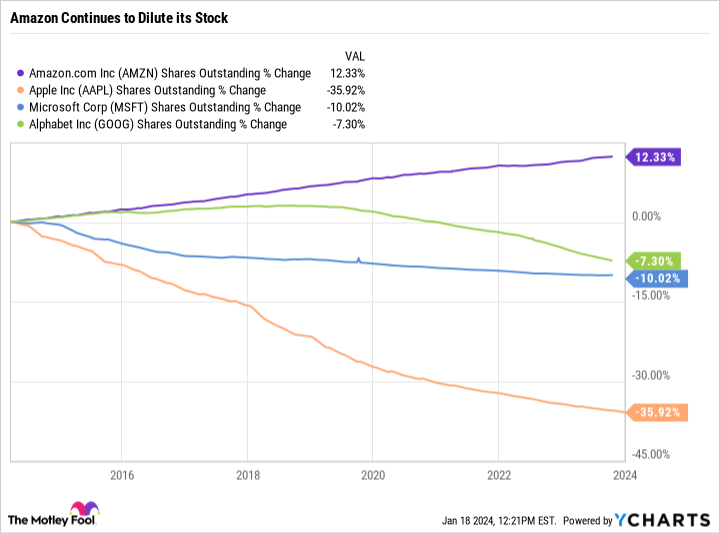“Magnificent Seven” is a term coined by Bank of America analyst Michael Hartnett to describe the seven largest tech-focused stocks in the S&P 500. They are Apple (AAPL 0.67%), Microsoft (NASDAQ: MSFT), Alphabet (NASDAQ: GOOG) (NASDAQ: GOOGL), Amazon (AMZN 0.80%), Meta Platforms (NASDAQ: META), Nvidia (NASDAQ: NVDA), and Tesla (TSLA 0.16%).
According to the weights of the SPDR S&P 500 ETF Trust — which mirrors the performance of the S&P 500, these seven companies alone make up a staggering 28.37% of the index’s value.
At the time of this writing, Nvidia is up the most year to date at 13.2%, and Meta Platforms, Microsoft, and Alphabet are all up, too. But Amazon is down slightly, Apple has lost over 5% of its value, and Tesla is down a painful 13.3%.
Let’s see if Tesla, Apple, or Amazon, are worth buying now.

Image source: Getty Images.
Tesla isn’t giving investors a lot to smile about
Tesla doubled in 2023 after losing nearly two-thirds of its value in 2022. The stock has been falling to start the year for valid reasons.
Tesla cut prices in China, raising concerns about the company’s declining margins. It also idled production at its factory in Germany. And on Jan. 15, CEO Elon Musk posted the following on X:
I am uncomfortable growing Tesla to be a leader in AI & robotics without having ~25% voting control. Enough to be influential, but not so much that I can’t be overturned. Unless that is the case, I would prefer to build products outside of Tesla. You don’t seem to understand that Tesla is not one start-up, but a dozen. Simply look at the delta between what Tesla does and GM. As for stock ownership itself being enough motivation, Fidelity and other[s] own similar stakes to me. Why don’t they show up for work?
Musk owns about 13% of Tesla, so he’s looking to essentially get double the voting rights than his equity would normally fetch.
The post is a concern for Tesla investors. Monetizing artificial intelligence (AI) and robotics is a long-term tailwind for owning Tesla stock. Fully autonomous self-driving vehicles would unlock the coveted robotaxi business model, a concept that could disrupt the ridesharing and delivery industry.
It’s no secret that Musk’s time is invested in projects aside from Tesla, namely SpaceX and X. But to come out and threaten Tesla shareholders that successful AI and robotics efforts are dependent on Musk gaining more voting control is out of line.
I still think Tesla can be a great long-term holding. But I think investors are owed some further clarification, which Tesla will hopefully provide when it reports earnings on Jan. 24.
The most balanced Magnificent Seven company
Slowing growth concerns are a big reason why Apple has had a rough start to the year.
AAPL Revenue (TTM) data by YCharts
If you look at the last 10 years, Apple’s revenue and earnings were growing nicely. Then they exploded higher during the worst of the COVID-19 pandemic as consumers flocked toward discretionary goods and away from services. But the last two years have been stagnant. Investors have relied on Apple’s stock repurchases to boost earnings per share when organic growth is slow. But Apple’s buybacks have hit a three-year low, although they are still sizable.
The glass-half-full argument would credit Apple for not giving back its pandemic-induced gains. After all, many companies saw artificially high growth in 2020 and early 2021, which pulled forward future sales. That period was followed by negative growth. Apple, on the other hand, has maintained its peak performance. If you zoom out, net income is still up just under 70% over the last five years, which is impressive for a company the size of Apple.
If you refer back to the chart above, you’ll notice that Apple’s margins fell in 2020 and 2021 because it was selling a lot of products. Since then, services growth has been the main highlight, which has allowed Apple to grow its margins and is a key reason why its profits have remained stable.
Apple has a wide moat, brand power, and a vertically integrated suite of products and services, allowing the company to grow its margins. Overall, it has the best risk/reward profile of any of the Magnificent Seven stocks.
Apple has yet to make a splash in AI. It has the cash on the balance sheet for a meaningful acquisition or investment. When that happens, Apple could garner a similar multiple to Microsoft, which has a 37.9 price-to-earnings ratio compared to Apple’s 30.7.
Amazon is too expensive
Amazon was my top stock to buy for 2023 mainly because the market was severely discounting the value of Amazon Web Services (AWS) and the stock had gone almost nowhere for four years. But now, it’s not as screaming of a buy. Amazon soared over 80% in 2023. AWS is no longer discounted, and the company just isn’t as good of a value.
Valuation matters when it comes to Amazon. Unlike Apple, Microsoft, and Alphabet, Amazon isn’t a cash cow. It barely makes any earnings, choosing instead to reinvest in the business. Amazon is ultra-aggressive to the point where its outstanding share count tends to increase gradually every year as it dilutes its stock, mainly due to stock-based compensation.
Amazon is the opposite of Apple, Microsoft, and Alphabet, which are buying back stock and seeing their share counts decrease. Over the last decade, Apple has reduced its outstanding share count by nearly 36%. Alphabet was diluting its stock, but in recent years, it has done a ton of buybacks, too.
AMZN Shares Outstanding data by YCharts
Amazon isn’t necessarily a stock worth selling, but it’s also not worth buying either. The risk-reward was amazing in 2022. But since then, the fundamentals haven’t improved, and yet the stock is far more expensive. Tesla, and especially Apple, stand out as better buys than Amazon right now.
Approaching the Magnificent Seven
Magnificent Seven companies have some similarities. But in general, there are two distinct categories. Apple, Microsoft, Alphabet, and Meta Platforms are the established, highly profitable cash cows. Meanwhile, Nvidia, Amazon, and Tesla are more growth-oriented.
The risk and potential reward for these companies vary based on each company’s industry, valuation, and strategy. If you buy an S&P 500 index fund, you’ll get a sizable amount of each company. But when it comes to investing in individual stocks, it’s OK to go with the Magnificent Seven stocks that are most appealing to you, that suit your risk tolerance, and that you believe in the most over the long term. For me, that’s Apple, Tesla, and Microsoft, but a case could be made for all seven stocks.
John Mackey, former CEO of Whole Foods Market, an Amazon subsidiary, is a member of The Motley Fool’s board of directors. Bank of America is an advertising partner of The Ascent, a Motley Fool company. Suzanne Frey, an executive at Alphabet, is a member of The Motley Fool’s board of directors. Randi Zuckerberg, a former director of market development and spokeswoman for Facebook and sister to Meta Platforms CEO Mark Zuckerberg, is a member of The Motley Fool’s board of directors. Daniel Foelber has no position in any of the stocks mentioned. The Motley Fool has positions in and recommends Alphabet, Amazon, Apple, Bank of America, Meta Platforms, Microsoft, Nvidia, and Tesla. The Motley Fool has a disclosure policy.



